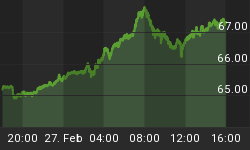"There are more tears shed over answered prayers than over unanswered prayers..."
- Teresa of Ávila, patron saint of headache sufferers
IT'S FIVE YEARS and $1.7 trillion of Chinese foreign reserves since the People's Bank of China ended its decade-long peg to the Dollar - the one at CNY8.3 which it had defended through the late '90s Asian Crisis and again as the Dollar first began its long decline in the early Noughties.
Back then however, as today, China refused to even begin make the Yuan freely convertible - and thus accessible to foreign investment - but for very different reasons. The fear in 2005 was of foreign speculators driving the Yuan lower. Whereas in 2010, it's got the opposite problem.
Grabbing export share (and that mountain of foreign-exchange reserves) by suppressing its currency, Beijing clearly fears a repeat of the Japanese bubble-and-bust that followed 1985's Dollar-weakening Plaza Accord. And since first loosening the Yuan's Dollar peg (if only a little) half-a-decade ago, China has overtaken Japan as the world's No.2 economy, and become the world's top importer of copper, biggest user of cement, No.1 consumer of energy, edible oils, soybeans, rice and wheat, and the No.2 destination for physical gold bullion.
Yes, China's currency should reflect this growth, at least as far as Western economists and other Asian central-bank reserve managers can see. But if US Treasury Secretary Tim Geithner gets his wish at the G20 meeting this weekend - and the Chinese Yuan bears a greater share of the Dollar's global devaluation - Beijing's purchasing power in the food, energy and mineral markets will only grow greater.
And where Timmy might want to watch out is that the growth must come at the expense of today's freely convertible currencies.

First, Beijing likely holds some $2 trillion or more of the "big four" reserve currencies - Dollars, Euros, Sterling and Yen. Gresham's Law says it's more likely to spend those holdings ahead of its own, increasingly valuable money, as it hoards ever-more food, energy and mineral resources.
Second, and should the Yuan extend its global usage from this year's McDonalds' bond float to central-banking reserves, the relative loss of purchasing power in Dollars, Euros, Sterling and Yen will only accelerate further. Together, the Big Four account for 96% of forex reserves according to the IMF, but that's the lowest proportion since before the late '90s Asian Crisis - a crisis which Beijing managed to avoid but remembers all too well.

Third, and most critically amid the global currency war - a war which will not be settled over the conference table for as long as Western central-bank policy remains fixated on currency inflation - flows of "hot money" are rightly expected, not least from US, UK and Japanese wealth fleeing zero-per-cent rates at home.
As it is, China is gently loosening controls on money outflows, but only a little, and actual outflows of Yuan remain blocked. So trying to preserve its global value, retained wealth in the West cannot get direct exposure to the currency (nor the equities at present) which will increasingly put a price on the biggest trend of the 21st century - the Eastward shift of global demand and consumption.
Even if China does liberalize (which it won't any time soon) retail investors will be last in the queue. So a fair proxy, meantime, remains buying hard assets and natural resources. It also gets to the heart of the problem, because living standards in the West (by way of our global purchasing power) are certain to fall long-term. Asia's growing use of world resources must come at our expense, in just the same way as the Pound Sterling's first fall from top-dog currency status - starting some seven decades ago, and running pretty much ever since - made for a relative loss of wealth to the United States.
Most clearly amid the currency turmoil only just getting started, China's ever-growing demand for physical gold and silver highlight that big, fat 21st century trend in action. By the time (if ever) that Yuan deposits become widely available through retail banking in the US, Eurozone, UK or Japan, this morning's $1319 price-tag on gold might look a great bargain.















